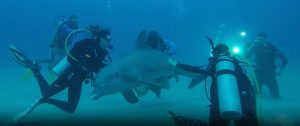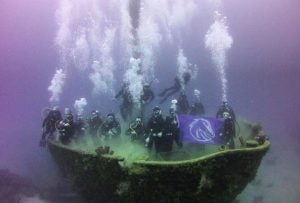There are not many people who can say they have interacted with dolphins in the depths of the ocean, or swam next to Caribbean reef sharks, unless you are a student in Shawn Simonson’s Hyperbaric Physiology course, in which case these once in a lifetime experiences are simply another teaching method used to instill learning that reaches far beyond the walls of a classroom.
Simonson, an associate professor in the School of Allied Health Sciences Department of Kinesiology, offers this unique interdisciplinary graduate course in the fall of even years. The course is designed to deepen a student’s knowledge of human anatomy and physiology, exercise physiology, physics, and biology as students learn how the human body adapts, and performs in the high pressure, hyperbaric underwater environment.
Fall 2016 was the second time this course has been offered, and students were able to earn their open water scuba certification from the Professional Association of Diving Instructors (PADI), and then embark on a capstone voyage at the end of the term to Roatan, Honduras. As one student explained, “This class will get you out of your comfort zone, but it is totally worth it and it’s even better to enjoy this experience with other friends who share the same passion. A trip like this might not come too often… so take advantage of the opportunity.”

The trip consisted of 13 open water dives, some of which included interacting with dolphins, and swimming with sharks, which was a trip highlight for many. One student explains, “Being surrounded by Caribbean reef sharks at seventy-feet was nothing short of awe-inspiring, and I can honestly say it was the most amazing experience that I have had in my life.”
Students also explored the physics of the underwater environment, marine flora and fauna adaptations, and witnessed firsthand how human actions on land may impact the unique ecosystem and environment of the sea. One student describes their greater appreciation for the fragile ecosystems of the ocean based on this experience. “The ocean is vast and holds many diverse ecosystems, and the greatest lesson I learned about the ocean while on this trip was just how much of an impact our everyday actions can have on those fragile ocean ecosystems. As humans, we need to respect the oceans and be mindful of the trash we are putting into them, and even be aware of how our seafood choices can affect ocean fisheries. Even though the oceans are large, they are not indestructible, and small actions add up… in order for the oceans as we know them to survive, we as humans need to be doing all we can to preserve them.”

Other students were impressed with the truly incredible adaptations that not only occur within the human body in response to a hyperbaric environment, but in other organisms as well. One student said, “The comparative physiology aspect of the class surpassed my expectations. It is incredible how all species of animals share similar physiological responses and how all have adapted so specifically to the typical lifestyle of the species, so placing ourselves in ‘their’ world opened my eyes to the impressive adaptations of marine wildlife.”
For students interested in taking this class in the future, it is highly suggested from past students to take advantage of this rare opportunity: “If this class is offered to you, I implore you to take it up…the trip at the end is the crowning jewel. You will learn so much about yourself and the world beyond diving and hyperbarics.”
As this unusual learning experience does cost more than an average class, Simonson and the Boise State University Foundation are seeking charitable contributions from individuals interested in partnering with this fantastic experience. Even a modest contribution could make the difference for a student struggling to cover the cost of this trip and every dollar is greatly appreciated. Donations make a huge difference for students; scholarships allow students to focus their time and attention on learning without worrying about how to finance their education. To donate to this life-changing course, contact Jon Larkin, development director for the College of Health Sciences, at JonLarkin@boisestate.edu or 208-426-2124, or choose the Kinesiology Hyperbaric Physiology Fund from the drop down menu on the Online Giving webpage.